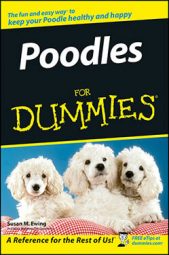The Poodle is considered one breed, with three "varieties" within the breed. Except for the size difference, each variety is identical to the rest. No matter what the size, a Poodle is an intelligent, friendly companion.
Poodle sizes, from largest to smallest, are
- Standard. Poodle is over 15 inches at the shoulders' highest point.
- Miniature. Poodle is 15 inches or less at the shoulders' highest point but measures at least 10 inches.
- Toy. Poodle stands 10 inches or less at the shoulders' highest point.
The three types of Poodle also have general differences in temperament:
- A Standard tends to be more aloof and self-contained.
- A Miniature picks her person and wants to always be with that person. A Mini never lets up; she always wants to do something — anything — with her person.
- A Toy is happy to curl up on your lap and cuddle.
It's not that a Toy can't excel in agility or doesn't enjoy obedience training or that a Standard isn't a loving companion, but, in general, the three types of Poodles do exhibit different personalities.
No matter what size you prefer, you're going to get a dog willing to participate in family activities. Poodles also are intelligent, which means that if you don't give them something to do, they'll invent something, which may not meet with your approval. Their intelligence means they're the perfect partners for performance event competition, but you don't have to compete. Teach your Poodle tricks. Have her pick up dirty laundry and put in it a basket. She can do the same with her toys when company's coming.
All three sizes are friendly and greet invited guests with a wagging tail. That doesn't mean that they won't sound the alarm if a stranger's at the door, and Standards can be effective guard dogs. Poodles shouldn't be shy or fearful of new people or events.

